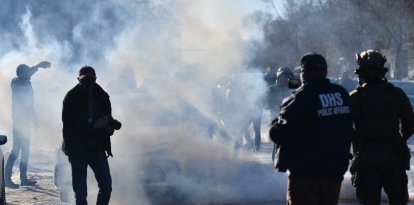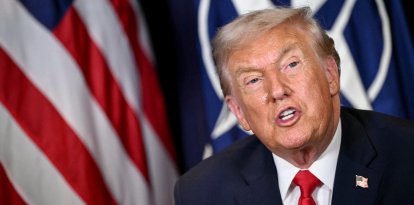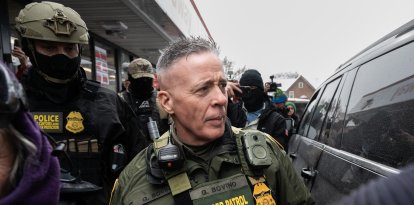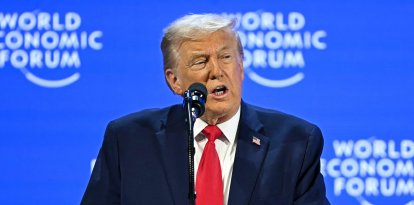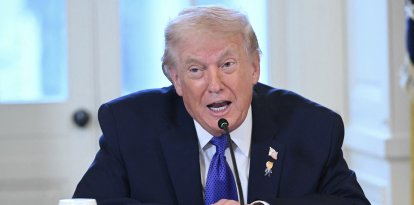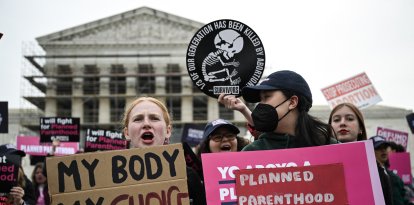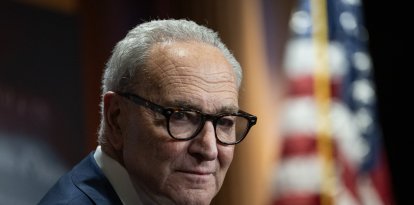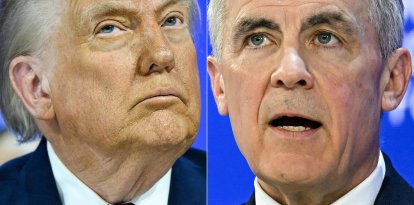Trump's allies begin to draft an immigration plan that includes mass deportations to control the border crisis
The country's top conservative immigration policy experts are designing a strategy to transform campaign rhetoric into real action.

Trump visita el muro en la frontera, en Texas. (AFP)
Former President Donald Trump's immigration policy is beginning to take shape at the hands of allies who started planning a series of unprecedented measures to control one of the worst border crises in the history of the United States.
According to a report in The Wall Street Journal, former Trump administration officials, supporters of the Republican leader and several conservative immigration experts are designing “executive orders, policy memos and other documents in a bid to transform campaign rhetoric into policy." The idea, as explained in the WSJ, is to finalize a mass deportation program in advance in order to control a migratory flow never seen before.
Discussions about this potential new immigration agenda are developing within important national conservative groups, such as the America First Policy Institute and the Heritage Foundation.
The main objective behind this effort is for former President Trump and his entire team to be ready so that, if a new administration begins, they can apply significant changes to the immigration agenda of the United States inherited by President Biden from the first day of his mandate. In addition, it lays the groundwork for the promised deportation of illegal immigrants.
“Those involved are discussing issues including ways to expedite migrants’ asylum hearings to make them more quickly eligible for deportation; rescind deportation protections for hundreds of thousands of migrants created by the Biden administration; and force countries across the globe to accept back more of their deported citizens,” reads the WSJ.
Foreign allies to control the migration crisis
According to the report, Trump's foreign policy collaborators have already begun to identify potential regional allies who can collaborate with Washington to control the migratory flow from Latin America.
One of those countries is Panama, where newly elected president José Raúl Mulino promised to close the Darién Gap, an inhospitable jungle crossed by hundreds of thousands of migrants to reach the United States.
According to the WSJ, the idea is to achieve new asylum agreements with countries in South America and Africa to revive agreements like the one that the Trump administration had reached at the time with Guatemala. In the case of Guatemala, Washington agreed to a short-lived program that sent back hundreds of migrants from El Salvador and Honduras to seek asylum there.
Unprecedented logistical and legal challenges
All this planning, even months before the general elections, demonstrates that Trump's immigration plan is as ambitious as it is complex, requiring intense coordination and structuring work with the country's leading immigration policy experts.
Trump's immigration policy, especially, will have to address important logistical challenges to carry out mass deportation and also the legal obstacles that may appear along the way.
“In addition to recruiting enough manpower to arrest migrants and opening up enough detention space to hold them, another important roadblock looms: The migrants who have arrived in the U.S. under the Biden administration aren’t currently legally deportable,” reads the WSJ. “And for those who are, many of their home countries won’t take them back. The executive actions that Trump’s advisers are planning are intended to circumvent those constraints without action from Congress.”
Likewise, who will be designated as Trump's “border czar” if he wins the elections is not yet defined. However, there are already several candidates.
One of the names that sounds strong is Tom Homan, who led Immigration and Customs Enforcement during the Trump administration.
According to the WSJ, Homan is a serious candidate to head the Department of Homeland Security or serve as “border czar,” a position that would not require Senate confirmation.
Homan stated that he is willing to accept a position in a potential second Trump term if the former president asks him. He also said that he agrees with the idea of massively deporting illegal immigrants.
However, in an effort to maintain secrecy, the Trump campaign insists that, beyond the leaked plans, there are still no names or anything officially defined about immigration policy or who could form a potential Republican cabinet.















